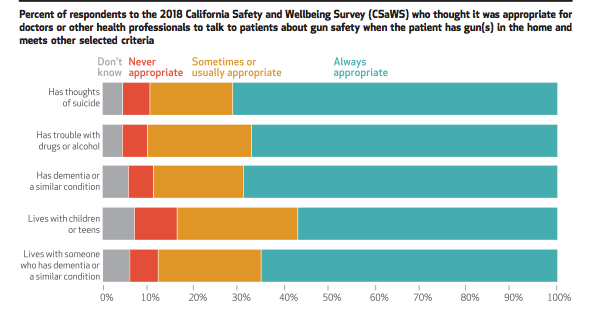UC Davis Firearm Violence Research Center used funds to publish three groundbreaking studies
The UC Firearm Violence Research Center (UCFC), the nation’s first research center of its kind, recently published three studies that take a closer look at the impact of firearm violence and potential prevention efforts. These studies are part of the first wave of state-funded firearm violence research in more than 20 years.
The center, which is housed at UC Davis, was established in 2017 to pioneer firearm research efforts, examining the impacts of gun violence despite national pushback and lack of funding. Funding for gun violence research all but disappeared in the 1990s as a result of the Dickey Amendment, which prevented the Centers for Disease Control and Prevention from using money “to advocate or promote gun control.” Since then, Arkansas Congressman Jay Dickey, who sponsored the amendment, has recognized the need to further study gun violence and is now a vocal supporter of the UCFC.
Dr. Garen Wintemute, director of the UCFC and professor of emergency medicine, has dedicated the last three decades to researching firearm violence and prevention. In the face of funding blocked by Congress, Wintemute has donated more than $1.1 million of his own money toward research. With $5 million in funds recently granted by the state to study firearm violence, Wintemute reflected on what public funds mean for the future of the center and research.
“Having state funding, particularly for the long term, makes it possible for us to undertake a wide array of research and education projects that will be of real benefit to the people of California and the United States,” Wintemute said.
The first study published delved into the relationship between DUIs and domestic violence, with the intention of researching whether a link exists between alcohol abuse and intimate partner gun violence. The study found that handgun owners with former DUI convictions, even without any other criminal history, are three times more likely to be arrested for intimate partner violence than individuals with no criminal history. The study proposes further regulation of firearm ownership among individuals with histories of alcohol abuse as one way to reduce intimate partner violence.
The second study analyzed public opinion on the topic of healthcare professionals discussing firearm safety with patients at risk of gun-related injury, including suicide. At the intersection of mental health and gun violence, this research focused on the fact that firearm-related injuries are the leading cause of death among teenagers between the ages of 14 and 22. Among those surveyed, around 66% of respondents agreed that it was at least sometimes appropriate for healthcare professionals to discuss gun safety with patients at risk of gun-related injury.
Rocco Pallin, the data analyst and author of this second study, had previously worked in community health and youth development in New Orleans before doing research on firearm violence.
“In that work, I could see the disruption that violence, and often gun violence, can cause to individuals, families and entire communities,” Pallin said.
The final study researched shortcomings regarding the effectiveness of background checks. In contrast with widespread rhetoric advanced by political leaders and lobbyists, 87% of the public supports background checks, according to a study in 2017 by the US National Library of Medicine. Among gun owners and Republicans, 85.3% and 88% respectively support checks. The study delved deeper into the ways in which established background checks are avoided, including the private sale of firearms and other failings of local and state oversight.
“Having grown up around guns, sport shooting and hunting, I see that there’s a lot of consensus on gun policies,” Pallin said. “I believe there’s room for evidence-based policies, for example, those that keep guns out of the hands of those who have demonstrated dangerous behavior, that large majorities of gun owners, who are a very diverse group, of course, would be glad to support.”
Gun violence research revolves largely around the goal of decreasing gun violence and gun-related deaths. Because of the partisan nature of gun ownership, however, many openly oppose the center’s research.
One group, the Firearms Policy Coalition (FPC), has stood in ardent opposition of research. FPC is a “coalition of hundreds of thousands of Patriots organizing to take back [the] Constitution” and defend their right to bear arms, according to its website. Spokesperson Craig DeLuz renounced the validity of the research itself in a KCRA article.
“From the beginning, it’s been about fabricating statistics to support their already predetermined conclusion, which is increasing laws and gun control,” DeLuz said. “We are not against research at all, but research has to be objective. Treating firearms or firearm violence like a disease is completely wrong because it removes the component of human behavior.”
Notably, all three studies published focus on human behavior, mental health, alcohol abuse and public opinion as these factors relate to gun violence, rather than focusing on guns themselves.
Written by: Ally Russell — campus@theaggie.org




